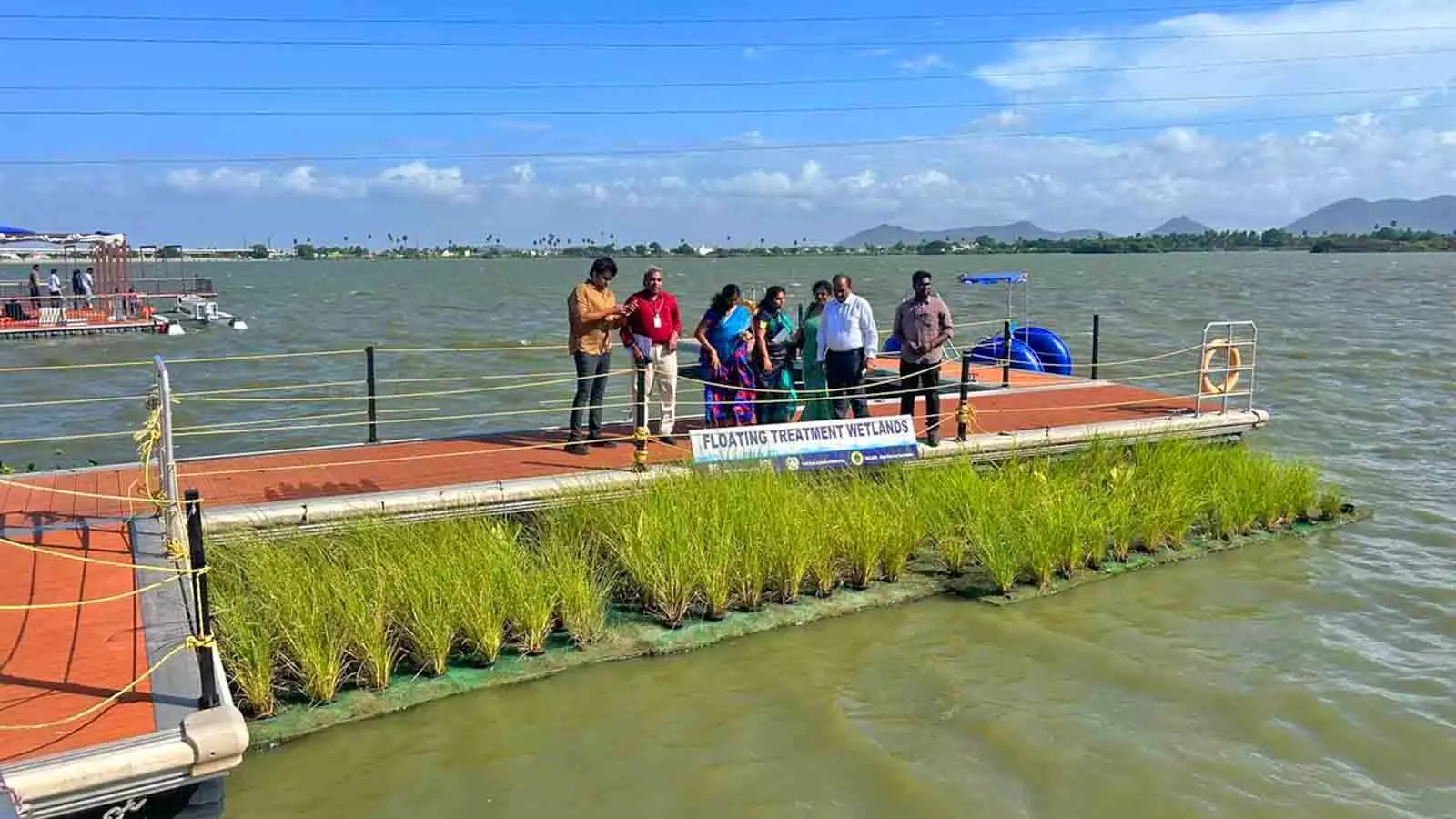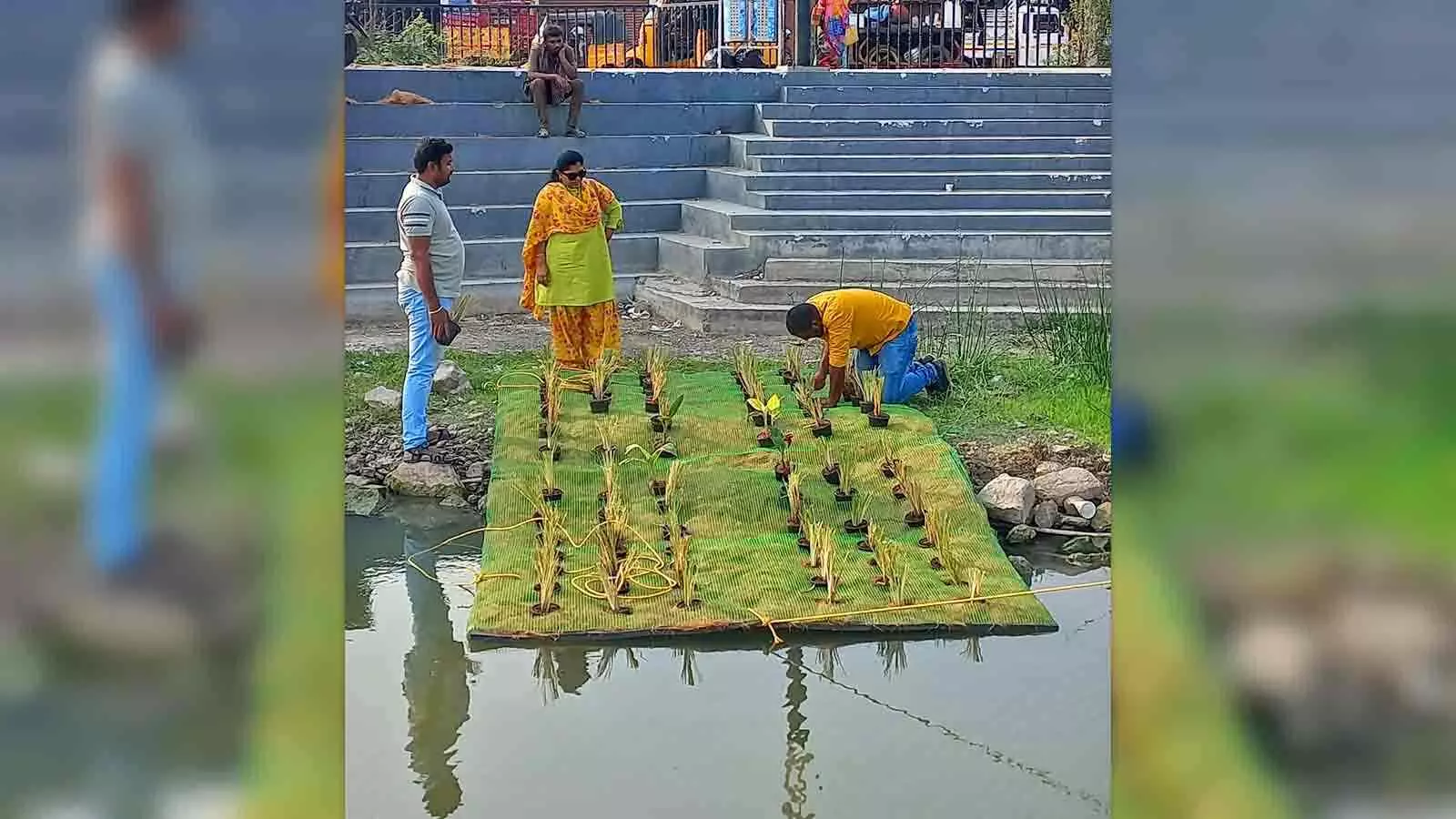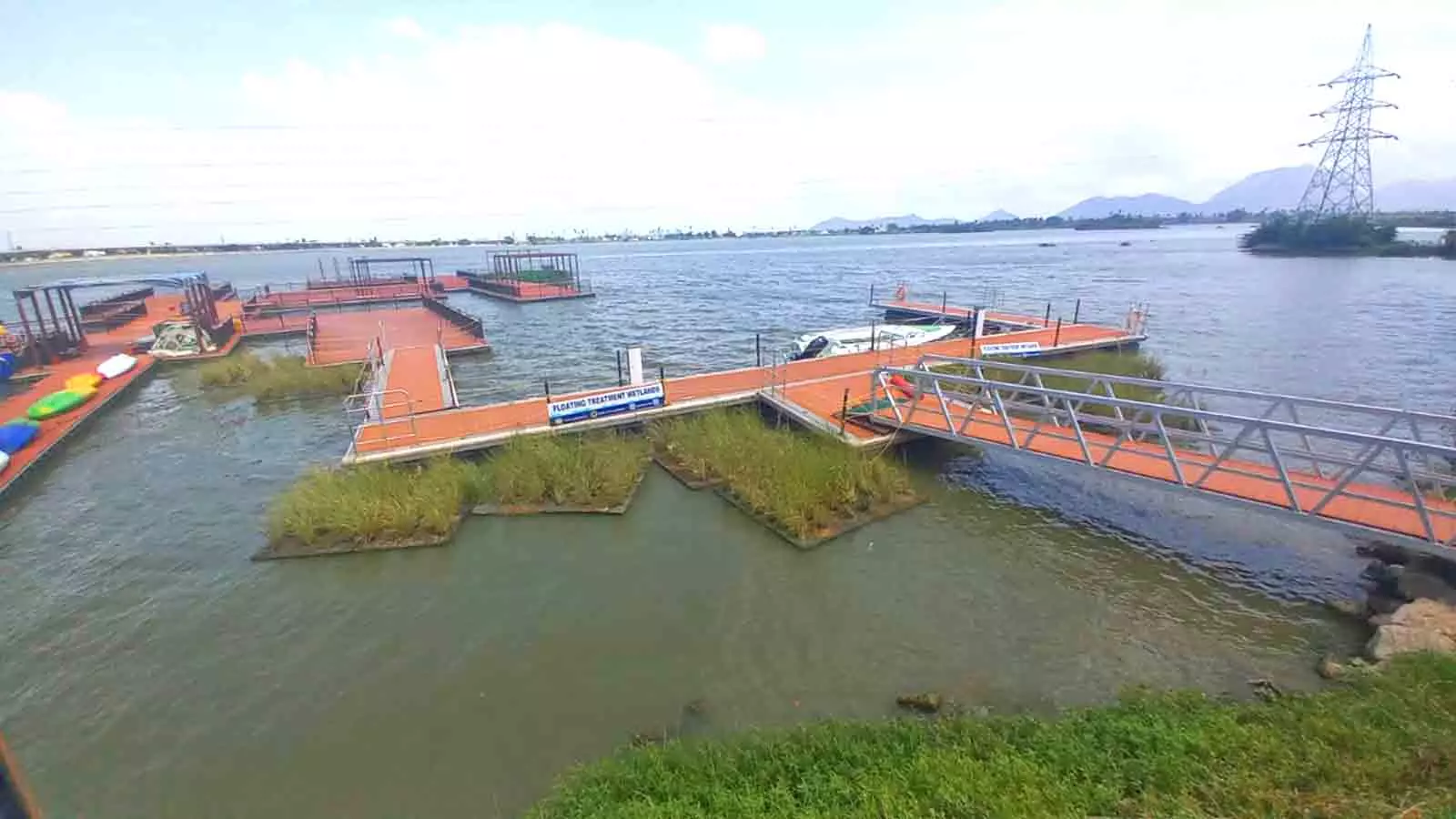
- Home
- India
- World
- Premium
- THE FEDERAL SPECIAL
- Analysis
- States
- Perspective
- Videos
- Sports
- Education
- Entertainment
- Elections
- Features
- Health
- Business
- Series
- In memoriam: Sheikh Mujibur Rahman
- Bishnoi's Men
- NEET TANGLE
- Economy Series
- Earth Day
- Kashmir’s Frozen Turbulence
- India@75
- The legend of Ramjanmabhoomi
- Liberalisation@30
- How to tame a dragon
- Celebrating biodiversity
- Farm Matters
- 50 days of solitude
- Bringing Migrants Home
- Budget 2020
- Jharkhand Votes
- The Federal Investigates
- The Federal Impact
- Vanishing Sand
- Gandhi @ 150
- Andhra Today
- Field report
- Operation Gulmarg
- Pandemic @1 Mn in India
- The Federal Year-End
- The Zero Year
- Science
- Brand studio
- Newsletter
- Elections 2024
- Events
How vetiver grass is weeding out effluents from Coimbatore’s Ukkadam Lake

Professor Sara Parwin Kamaludheen of Tamil Nadu Agricultural University (TNAU), Coimbatore, refers to vetiver—a fragrant perennial grass—as a ‘magical plant’. Her involvement in a national-level conference on vetiver at the university eight years ago, which she attended with her students, ignited her passion for researching how this versatile plant could be used in sewage...
Professor Sara Parwin Kamaludheen of Tamil Nadu Agricultural University (TNAU), Coimbatore, refers to vetiver—a fragrant perennial grass—as a ‘magical plant’. Her involvement in a national-level conference on vetiver at the university eight years ago, which she attended with her students, ignited her passion for researching how this versatile plant could be used in sewage treatment.
The moment proved to be a turning point in her career as it led to the development of an innovative sewage treatment float using vetiver grass. Professor Sara has since patented the design of this float, which has been successfully deployed in several waterbodies across Tamil Nadu as an eco-friendly bio-effluent fighter.
Vetiver is a densely tufted grass that thrives in various types of soil, even in hydroponic systems — the technique of growing plants using a water-based nutrient solution rather than soil. Research has shown that this grass is drought-tolerant and capable of absorbing harmful chemicals from contaminated waterbodies.

Vetiver is a densely tufted grass that thrives in various types of soil, even in hydroponic systems — the technique of growing plants using a water-based nutrient solution rather than soil.
While vetiver is most commonly known in India for its use in producing perfumes and cosmetic products, the International Vetiver Network (IVN), based in Texas, has promoted vetiver’s role in controlling soil erosion, preventing landslides, and even contributing to carbon sequestration. Vetiver floats have also been tested in waterbodies across countries such as Sri Lanka and Indonesia, providing further evidence of its potential in environmental management.
At present, Sara, along with her students, has been testing the effectiveness of vetiver floats in laboratories and waterbodies in Coimbatore, as well as in wastewater treatment plants across Tamil Nadu. Their research has been documented in several international journals, establishing them as pioneers in this unique area of study.
Research has demonstrated that due to its exceptional morphological and physiological characteristics, vetiver grass can be used as an effective phytoremediation tool to address polluted water. Specifically, it has been successfully applied to treat municipal wastewater, sewage effluent, industrial wastewater, and even landfill runoff. The plant’s remarkable ability to survive and thrive in polluted environments makes it an ideal agent for environmental cleanup efforts.
Professor Sara attributes much of the success of the vetiver float project to the students who initially proposed testing the plant’s potential in effluent treatment. She notes that while she contributed as a mentor, the idea to explore vetiver for water treatment came from her students, whose enthusiasm and innovative thinking propelled the project forward.

Vignesh grew Vetiver in contaminated soil and water.
“The vetiver conference was a turning point in my life. It's not always necessary that a teacher teaches the student. In my case, I gained enlightenment through my students,” she said. “I assisted them in their research when they proposed using vetiver for effluent treatment in our laboratory. Now, we have developed a vetiver float method that is effective in absorbing pollutants from waterbodies in an eco-friendly manner.”
One of the key contributors to this groundbreaking research is M. Vignesh Kumar, a former student of Professor Sara. Vignesh shared that he spent nearly four months measuring the growth of vetiver in contaminated soil and water surfaces.
The project began as an exploratory idea during a casual conversation when Sara encouraged her students to suggest a plant that could be used in bioremediation. Bioremediation, a sustainable approach to environmental contaminant management, is a process that uses microorganisms, plants, or their enzymes to clean up contaminated sites and restore them to their original condition.
Vignesh, driven by curiosity, proposed vetiver as a potential candidate.
To test his hypothesis, Vignesh grew Vetiver in contaminated soil and water. “I mixed the water with heavy metals like zinc, lead, and chromium and watered the plants daily. The soil, sourced from a construction site, was processed through an acid wash to remove any nutrients, ensuring it would be contaminated. Despite these harsh conditions, the vetiver grass flourished. Out of the 24 plants tested, only two withered, while the remaining plants thrived and developed roots up to 20 cm in length,” Vignesh told The Federal.
Vignesh’s successful experiment prepared the foundation for further research. Upon completing his research project and graduating with a master’s degree, Vignesh gained valuable insights that would shape his career. He is now a project associate in Tamil Nadu’s Climate Change Mission, where he applies his research experience to develop cost-effective, sustainable solutions for climate change-related challenges.
The success of the lab-based tests prompted Professor Sara and her students to expand the project and test vetiver's effectiveness in larger, real-world scenarios. They created a man-made pond on the university campus and filled it with contaminated water sourced from Ukkadam Lake in Coimbatore. They then grew vetiver plants in plastic floats for three months, periodically testing the water for contamination levels.

The results were promising. As the vetiver plants flourished, they absorbed a significant amount of heavy metals, effectively purifying the water. This success led the team to design a hydroponic platform, or float, that could hold 84 vetiver plants. These floats were then placed in Ukkadam Lake for a pilot study, where they were monitored for 16 months to assess their sturdiness and effluent absorption capabilities. The research confirmed that the vetiver roots acted as natural water filters, absorbing a wide range of pollutants from the water.
“Through this test, we also evaluated the efficiency of the float design, which we have since patented,” Sara explained.
Following the success of their initial tests in the lake, Professor Sara and her students decided to test the vetiver floats in dyeing effluent wells, which are notorious for containing harmful chemicals. The research focused on using hydroponics and floating wetlands to clean contaminated dyeing effluent. The results were again promising. The vetiver plants showed resistance to the contaminants present in the polluted water and exhibited high efficiency in remediating dyeing effluents.
The study confirmed that using vetiver grass under hydroponic conditions is a feasible and complementary treatment method that can significantly reduce levels of total solids, dissolved oxygen, and biological oxygen demand within just 30 days.
M. Aarthy and G. Karthikeyan, two students who contributed to this aspect of the research, shared their findings, stating, “Our study showed that vetiver plants are resistant to the contaminants in polluted water and possess greater efficiency in the remediation of dyeing effluents.”
The research on vetiver floats continues to progress, with new pilot projects on the horizon. A demonstration unit for vetiver floats has already been established at Tamil Nadu Agricultural University, and additional projects are planned for locations such as the Horticultural Research Station in Yercaud, as well as lakes in Yercaud, Udhagamandalam, Sivakasi, and Puducherry. These initiatives are part of a larger effort to use vetiver as a sustainable solution for managing water pollution and addressing environmental concerns in India.
Environmentalist R.Padmapriya says the innovative use of Vetiver grass in water treatment is proving to be a game-changer in the fight against pollution.
“Thanks to the hard work and dedication of Professor Sara Parwin Kamaludheen, her students, and their collaborative efforts, vetiver floats have become a promising tool in cleaning contaminated water bodies. As research and real-world applications continue to expand, the potential for vetiver to contribute to environmental sustainability and pollution management looks increasingly bright,” she said.
She also pointed out that the World Bank has funded a couple of projects in countries like Nigeria and Vietnam for usage of vetiver to prevent erosion, watershed management and riverbank restoration projects.
“Vetiver plant has been limited to be used as a cosmetic product. With this floats experiment proving good results, the government should promote cultivation of vetiver to be used for floats. And also bridge the handicrafts industry to use the roots that grow in these floats,” she said.
